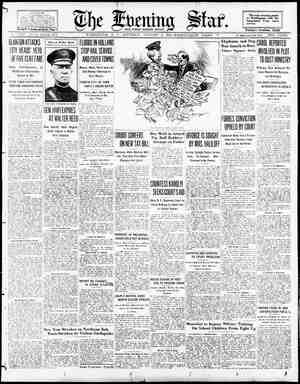The Daily Worker Newspaper, January 2, 1926, Page 14
You have reached the hourly page view limit. Unlock higher limit to our entire archive!
Subscribers enjoy higher page view limit, downloads, and exclusive features.
ame “Go Home, Mr. French Capitalist! “ imperialist powers—and thereby become the allies o RS see oo} 42) < ~ 2 & oc & Maurice Becker, celebrated cartoonist, shows the new spirit of the peoples of the East, who resist the colonial plundering of the eel ab SN AI AS RR ASI RRS TSEC EE the revolutionary working class at home. Concerning “Barbusse-ism” HENRI BARBUSSE, whose fame as a novelist is hard- ly equalled by any writer in the whole world of those who have arisen during and after the great world war—IS A COMMUNIST. Henry Barbusse leaped into world fame with his war novel, “Under Fire,” a book in which he told his terrible... experiences in the trenches as a soldier of the French army. Since that monumental work Barbusse has maintained and enlarged his standing as the world’s leading young artist, with such other books as “Chains.” Henri Barbusse is the envy of the literary world. But Henri Barbusse prefers to write for—THE COMMUNIST PRESS! Henri Barbusse is writing for —The DAILY WORKER MAGA- ZINE SUPPLEMENT! Henri. Barbusse has conveyed to The DAILY WORKER the right to publish for the first time in the English language his great new novel which bears the French title, “I’7AU DELA”! This great novel will begin in the next issue of The DAILY ‘WORKER Magazine Supplement —neat Saturday, January 9. The translation is being prepared by the well known American Com- munist artist, Lydia Gibson. But why does Henri Barbusse prefer to cast aside the glittering world of capitalist class rewards? Barbusse tells why in the ad- joining article from his own pen. 1 iam Ra By HENRI BABUSSE. (Translated by Harrison George from “La Antorcha”) I? has come to my notice that in a certain circle the subject, of “Barbusse-ism” was placed on the agenda of a public debate, and this same theme has been the object of lively comment in certain foreign centers. - I do not know what my friends and adver- saries might be able to say on this question, for or against me, but if I might be permitted to offer a personal opinion on the subject I would say: “Barbusse-ism” does not and cannot exist, and this for reasons which I am glad to-fur- nish to my readers. " I am a writer who has tried to project cer- tain generalizations and to enclose scenes of great dimensions and dramas of ideas within the architecture of books. Perhaps, with a lit- tle benevolence, it might be conceded to me that I have in this respect somewhat widened the field of literary action. ‘ . I have felt impelled by those principles of art which determine unified conceptions—or per- haps it may have been my ideas that have in- cited me to seek by that road new forms of ex- pression; but if I add that I have always been sincere, it is to add also that this is not enough; that the writer must be not only sincere but also. truthful. The quality of his affirmation—because there is no work of art that does not affirm some- thing—is much more important than his good personal intentions. I have already declared elsewhere that a writer is a public man who has no right to err because erring, he makes others err. I believe that I have not erred. This pleas- ant certitude, which would be quite presump- tuous in the transcendental plane of metaphy- - - ;-sics, is not so in the terrain of social things, so bound to the heart and towards which all those that have today the pretense of thought are irresistibly attracted. I have interested myself with as much fer- vor as certainty in a number of principles con- cerning present society: the arbitrary and arti- ficial organization of capitalist despotism; re- ligious superstitions; democracy and patriot- ism; the formidable deceit of reformism; the necessity of the conquest of power and the reg- ulation of labor by the working class; and in- ternationalism. My comrades will recognize how little this resembles any original doctrine that might be my personal one, and they will see that I have discovered nothing that others have not al- ready discovered. I personally joined the Communist Party. I belong to it definitely and I am able to say that I will always belong to it. If until now I have not contributed my voice, I will do so from now on, in view of the battle waged by those who personify the dogmas that I-detest. , it has been said frequently that it was a mis- take for me to join the party. Never have I understood the arguments that have been ad- duced on this score. Reasons of immediate: personal interest? They are quite debatable. But even though they might exist, I cannot see why I should give myself any other reason than those I give at times to the comrades in order to persuade {them that they must sacrifice their immediate ou ag to their interest more broadly under- stood. } In our times, to keep on the fringe of the struggles that are transforming life, and to lose sight of their great objectives, is contrary not only to loyalty, but also to common sense,



